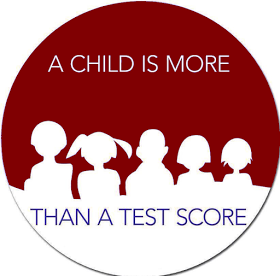Here are links to last week's
† articles receiving the most attention on NEIFPE's social media accounts. Keep up with what's going on, what's being discussed, and what's happening with public education.
Be sure to enter your email address in the
Follow Us By Email box in the right-hand column to be informed when our blog posts are published.
The next
In Case You Missed It will post on December 5.
THIS WEEK
This week's post has important, analytical information about the NAEP test scores, including a reminder that "proficient" does NOT equal grade level.
We also have reports on the school board elections in Indiana, the governor of Virginia's plan to whitewash history, and educational harassment at a charter chain. Jan Resseger answers all of those with a call for public education advocates to fight back.
Fort Wayne Community Schools sets a test score goal and some ideas for bringing success to public school systems.
DO STUDENTS NEED TO "CATCH UP?"
Worried About Helping Students “Catch Up”? Here’s How To Do It.
The NAEP, like most other standardized tests, is being misused and incorrectly interpreted. The public needs to be constantly reminded that "proficient" does not equal "grade level." Read Peter Greene's analysis.
From
Peter Greene in
Forbes
You've been seeing plenty of headlines about the dismal scores on the National Assessment of Educational Progress test scores.
Despite the panic, the NAEP results have provided no clear answers about any of the things people want answers about. As we saw with the "little" NAEP results, there's no clear connection between school closings and dropped scores— staying open when other schools were closed did not produce any clear advantages. And in fact some score declines mirrored other pre-pandemic declines.
Add this on top of the usual caveats about the test. NAEP’s “proficient” is set considerably higher than grade level, as noted on the NAEP site. (This is a lesson that has to be relearned as often as NAEP scores are released.) Students who don’t achieve “proficient” are not “below grade level.” And when interpreting scores, NAEP is extraordinarily clear that folks should not try to suggest a causal relationship between scores and anything else. There are too many factors in play to point to any single factor as a clear cause.
ELECTION 2022 - ANTI-CRT CANDIDATES
‘Anti-CRT’ candidates underperform
Sadly, Indiana's school board elections have become political.
From
School Matters
Indiana, unlike most of the country, did experience a partisan red wave on Nov. 8. Republicans won every statewide race, easily. They won seven of nine congressional districts and came close to winning an eighth. They held their supermajorities in the state House and Senate. If there’s a state where anti-CRT rhetoric should have swept ideologues onto school boards, Indiana is it.
But there’s not much evidence that happened. Surveys show that most Americans, regardless of politics, have a positive view of their local public schools. Farfetched claims that schools are indoctrinating students with a “woke” agenda may play well on right-wing media, but most Hoosiers know better.
WHITEWASHING HISTORY
Virginia: Governor Youngkin Directs Whitewashing of History Standards
Virginia Governor Youngkin wants to remove non-white history from the state's history curriculum.
From
Diane Ravitch
Educators, parents, and civil rights groups in Virginia are outraged because Governor Glen Youngkin has directed the rewriting of the state’s history standards. The Youngkin standards eliminate anything that extremists and rightwingers find objectionable. The Youngkin team initially deleted all mention of Dr. Martin Luther King Jr. from the elementary curriculum. Presumably any discussion of Dr. King’s life and legacy might be interpreted as “critical race theory” by the Governor’s allies.
At the same time, Youngkin’s cultural warriors expanded coverage of Ancient Greece and Rome, expecting children in the early elementary years to learn about major figures in those civilizations for whom they have no context or understanding.
In the rewrite of the standards by the Youngkin team,, a startling amount of material about African Americans was deleted. The curriculum and standards were literally whitewashed.
And as you will notice, the Youngkin draft refers to Native Americans and indigenous peoples as “the first immigrants.” What?

We can't sit back and let the anti-public education forces destroy our public schools. We have to fight back.
From
Jan Resseger
...This background from experts prepares us to recognize today that Moms for Liberty and similar groups disturbing local school boards with racist and homophobic attacks are part of a conscious strategy of funders like the Heritage Foundation and the Goldwater and Manhattan Institutes to grow school privatization and undermine public support for our society’s largest and most universal civic institution. In my state, Ohio, House Bill 290, the universal, Education Savings Account school voucher bill, which will be hashed out this month in a lame-duck session of our gerrymandered, supermajority Republican state legislature, is intimately connected with the mass of culture war bills that have been introduced in the same legislature—bills that would ban books and ban any discussion that touches on race, gender, and sexuality. The culture war bills are there to make us define some of our children as “other” or deviant, to generate fear and unease, and to destroy commitment to a public system of education that has been made more inclusive over the decades in accordance with its declared mission of serving each and every child.
Whose responsibility is it to push back against today’s attack on public education? In his 2021, book, The Privatization of Everything, Donald Cohen assigns the obligation for protecting a democracy to its citizens: “In a democratic society, public goods…. should be defined by the public and its values. Just because some people can be excluded from having a public good does not mean we should allow that to happen. In fact, after we the people define something as a public good, we must use our democratic power to make certain that exclusions do not happen… no winners or losers—when it comes to education (or clean water, or a fair trial, or a vaccine), even if it’s possible to do so. We decide there are things we should do together. We give special treatment to these goods because we realize that they benefit everyone in the course of benefiting each one—and conversely, that excluding some hurts us all. That starts with asserting public control over our fundamental public goods… What’s important is that public goods exist only insofar as we, the voters and the people, create them. That’s how democracy should and often does work. But it really works only if we can hold on to an idea of the common good. Is it good for individuals and the whole?” (The Privatization of Everything, pp. 6-8)
EDUCATIONAL HARASSMENT AT SUCCESS ACADEMY
Success Academy Parents Speak Out. Part 2 “I was told my seventh-grade daughter had to repeat entire grade because she failed one course by one point”
From
Gary Rubinstein's Blog
Success Academy is known for its high 3-8 standardized test scores and its extreme rigidity. In a way, the rigidity is part of what causes them to have such high test scores. They demand compliance from their students and from the families of those students. When a student or the family of a student is not conforming to the expectations of the school, that student or family are going to be harassed, humiliated, and punished until they either fall into line or ‘voluntarily’ transfer to another school.
The heartbreaking saga of a girl I will call ‘Carla’ began pleasantly enough eight years ago when she was accepted into Success Academy Springfield Gardens as a kindergartener. From kindergarten through fourth grade, she thrived at the school. Her fourth grade report card grades were mostly the highest or second highest category, except for writing where she was struggling.
In fifth grade, she started having problems academically, though not catastrophically, and then as we all know, the pandemic hit and schools in New York went remote for the next year and a half. For the end part of fifth grade and all of sixth grade, Carla struggled to learn remotely. She had various connection issues and would wait in zoom waiting rooms endlessly. She was really traumatized by the pandemic year and was eager to return to in person classes for her seventh grade year.
FWCS SETS TEST SCORE GOAL
FWCS sets reading goal of 95% passing by 2027
It's too bad that FWCS needs to focus on test scores. The pandemic caused emotional trauma, aside from academic losses. Focusing on the test scores alone, and of third graders, in particular, might cause some to ignore the real needs of children. Luckily, we know that most teachers rarely ignore the needs of children to focus entirely on test scores, but children's needs, rather than test scores, should be the system-wide focus.
From the
Fort Wayne Journal Gazette**
The Fort Wayne Community Schools board formalized its expectations Monday about students' reading skills, matching a statewide goal of reaching a 95% passing rate on a key exam by 2027.
Board member Steve Corona, who presented the resolution, hopes FWCS' resolution encourages other boards and districts to do the same.
"We as a state have to get serious about this," Corona said after the meeting.
FWCS and other districts saw their scores plummet on the Indiana Reading Evaluation and Determination assessment, or IREAD-3, when testing resumed in 2021 after disruptions caused by the coronavirus pandemic. The exam measures third grade literacy proficiency.
SOME GOOD NEWS SCHOOL SYSTEMS
Disrupting disruption: How 3 school districts improved with steady work
From the
Answer Sheet
Public schools are frequently in the news these days, and seldom is the news good. The spotlight is on ideological donnybrooks over how race and gender-related topics are discussed in classrooms; the growing demand that parents, not teachers, decide what their children should be taught; assaults on the system by opportunistic politicians; and the learning loss blame game, with schools faulted for keeping schools closed during the pandemic. Some state lawmakers have proposed junking the common school and replacing it with a market-based regime.
The good news is that it doesn't have to be this way.
In “Disrupting Disruption,” my co-authors and I shine a light on three racially and ethnically diverse school systems: Roanoke, nestled in Virginia’s Shenandoah mountains; Union, Okla., Tulsa’s neighbor; and Union City, N.J., across the Hudson River from Manhattan. Their students don’t resemble those in highflying places like Wilmette, Ill., or Lexington, Mass., predominantly White and well-off, with their off-the-charts test scores and graduation rates, and they do not appear on any list of the nation’s highest-performing districts. But they look like much of America, where White students don’t constitute a majority, and many come from low-income families.
**
Note: The Fort Wayne Journal Gazette is behind a paywall. Digital access, home delivery, or both are available with a subscription. Staying informed is important, and one way to do that is to support your local newspaper. For subscription information, go to
fortwayne.com/subscriptions/ [NOTE: NEIFPE has no financial ties to the Fort Wayne Journal Gazette]
†Note: NEIFPE's In Case You Missed It is posted by the end of the day every Monday except after holiday weekends or as otherwise noted.
###









